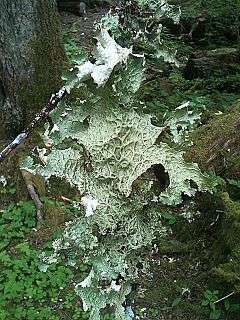Lobaria oregana
| Lobaria oregana | |
|---|---|
 | |
| Lobaria oregana in the Hoh Rainforest | |
| Scientific classification | |
| Kingdom: | Fungi |
| Division: | Ascomycota |
| Class: | Lecanoromycetes |
| Order: | Peltigerales |
| Family: | Lobariaceae |
| Genus: | Lobaria |
| Species: | L. oregana |
| Binomial name | |
| Lobaria oregana (Tuck.) Müll.Arg. (1889) | |
| Synonyms[1] | |
|
Sticta oregana Tuck. (1874) | |
Lobaria oregana, also known as lettuce lichen and as Oregon lungwort, is a species of foliose lichen occurring in North American old-growth forests, such as the Hoh Rainforest in Washington State. Taking its common name from its lettuce-like appearance, the lichen grows in the tree canopy but falls to the forest floor, where it is consumed by deer, elk, and other animals.[2] The species was first described by American botanist Edward Tuckerman in 1874 as Sticta oregana, and later (1889) transferred to the genus Lobaria by Swiss lichen specialist Johannes Müller Argoviensis.[1] Via cyanobacteria, it fixes nitrogen from the air, which then enters the local ecosystem when eaten or when absorbed by rootlets which the host trees extend from their own bark into the lichen.[3]
References
- 1 2 "Lobaria oregana (Tuck.) Müll. Arg. 1889". MycoBank. International Mycological Association. Retrieved 2001-08-03.
- ↑ Bolen, E.G. (1998). Ecology of North America. New York, NY: John Wiley & Sons. p. 346. ISBN 0-471-13156-3.
- ↑ Mathews, Daniel (1988). Cascade-Olympic Natural History: a Trailside Reference. Raven Editions. pp. 290–1. ISBN 0-9620782-1-2.